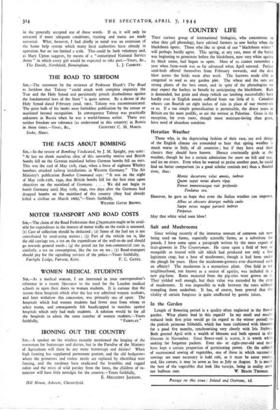COUNTRY LIFE
THAT curious group of international biologists, who concentrate on what they call phenology, have advised farmers to sow barley when the blackthorn opens. Those who like to speak of our " blackthorn winter" will perhaps hardly agree. This spring, at any rate, most of the barley was beginning to germinate before the blackthorn, now very white against its black stems, had begun to open. Most of us cannot remember a year when farm-work was so far advanced when April entered. Perfect seed-beds offered themselves from February onwards, and the dust blew across the fields week after week. The harrows made tilth as congenial to seed as any garden plot. The wheat and the oats are strong plants of the best omen, and in spite of the phenologists we may expect the barleys to benefit by anticipating the blackthorn. Rain is demanded, but grain and sheep (which are lambing successfully) have hardly ever in English annals suffered from too little of it. Canadian wheats can flourish on eight inches of rain in place of our twenty-six or so. If a too simple generalisation is permissible, the driest years in Britain are the most prolific, as are the wettest in Palestine. Grass is the exception, for even roots, though more moisture-loving than grain, have need of abundant sunshine.
Horatian Weather Those who, in the deprecating fashion of their race, say evil things of the English climate are astounded to hear that spring weather is much worse in Italy, of all countries ; but if they have read their classics they should have known. Horace continually girds at the weather, though he has a certain admiration for snow on hill and tree, and ice on rivers. Even when he wanted to praise another poet, he could find no better comparison (as a good scholar reminds me) than a flooded river, thus:
Monte decurrens velut amnis, imbres Quem super notas aluere ripas Fervet immensusque ruit profundo Pindarus ore.
However, he gave us hope that even the Italian weather can improve.
Albus ut obscuro deterget nubila caelo Saepe notus neque parturit imbres Perpetuo.
May that white win d soon blow!
Salt and Mushrooms Since writing recently of the immense amount of common salt now being used on farms, especially scientific farms, as a substitute for potash, I have come upon a paragraph written by the most expert of fruit-growers in The Countryman. He came upon a field of beet or mangolds so treated with salt which had produced not only a fine legitimate crop, but a host of mushrooms, though it had been under the plough for years. Have the mushroom-growers ever discovered such an affinity? The mushroom is a mysterious plant. One field in mY neighbourhood, not known as a source of agarics, was included in a new pig-farm. Roots manured from the pig-sties were grown on it. They yielded well enough, but their value was exceeded by the crop of mushrooms. It was impossible to walk between the rows without trampling them underfoot. It has, of course, been proved that the vitality of certain funguses is quite unaffected by gastric juices.
In the Garden
Length of flowering period is a quality often neglected in the flower garden. What plants lead in this regard? In my small and much- reduced beds first prize would go (in regard to the winter period) to the pinkish primrose Sibboldii, which has been cushioned with blossom for a good five months, synchronising very closely with Iris Stylosa. Both greeted April with a wealth of blossom and both opened in she blossom in November. Since flower-seed is scarce, it is worth while seeking for forgotten packets. Even six- or eight-year-old seed may have kept a certain proportion of germinating power. On the subject of successional sowing of vegetables, one of those in which successie sowings are most necessary is kohl rabi, as it must be eaten youne. and, like carrots, it may be sown as late as July or August. It is much the best of the vegetables that look like turnips, being in reality stalk Postage on this issue : Inland and Overseas, rd.


























 Previous page
Previous page